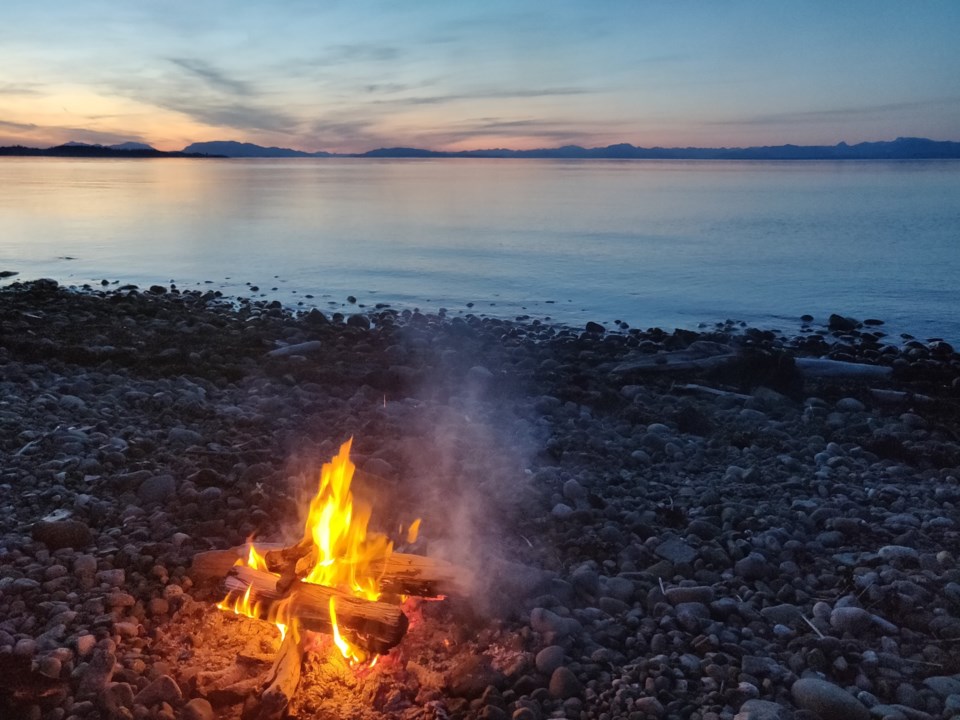The humble campfire has been a centrepiece of humanity since the beginning. Control of fire was critical in our early evolution as a species by providing warmth and light. It also allowed protection from predators at night; was a way to fabricate more advanced hunting tools; and a way to cook food that was hunted or foraged. By allowing human activity to continue into dark and cold nights, campfires paved the way for early human migration.
Hundreds of thousands of years later, the humble campfire still draws people together. Stories are told, meat and marshmallows are roasted, memories are made, and everyone shuffles around to avoid the smoke when the wind changes direction. Some of my favourite memories in Canada are of sitting around a campfire with several generations of family just chatting and enjoying the beautiful B.C. outdoors. I’ve also enjoyed a few stag trips where friends sit around a campfire and laugh at each other so hard they fall off their camp chairs. Like most Canadians, I’m a fan of small, controlled fires.
The environment we live in has changed in the last couple of centuries. Fire mitigation methods mean people are more comfortable living in and around forested areas. The average active citizen prefers living amongst trees (on account of trail access) or just simply feeling a closer connection to nature in their daily lives (this pretty much includes everyone who lives in the Sea to Sky corridor). But the rainy “Wet Coast” we’ve learned to love isn’t nearly as wet anymore, nor as cool. And our homes nestled among these beautiful trees are more and more likely to burn down as a result.
The year 2023 is B.C.’s most destructive wildfire season on record. But unless you’re watching the news or scanning the social media headlines, you wouldn’t know it in Whistler by looking up at the sky. As of Sunday, July 30, fires were burning in pretty much every part of the province, with only a handful scattered on the South Coast. Even with the growing fire at Casper Creek near Anderson Lake, we haven’t yet had the acrid smoke descend on our valley (at the time of writing—knock on wood). Our recreationally-focused lives have experienced very little disruption in the bubble, and our days paddling on the lake continue unhindered. I somehow feel we’re cheating the 2023 wildfire season in our little pocket of British Columbia.
If you look at the temperatures outside of B.C., it starts to feel even more like we’re heading into a heat-induced apocalypse. Phoenix, Ariz. just had 30 straight days of 43 C. It’s a desert city and it’s always hot there in the summer, but the consistent, record-breaking temperatures throughout the last month have been so hot that the iconic saguaro cacti are dying. If these heat trends continue—as climate scientists expect them to—it wouldn’t surprise me if large swathes of America’s southwest are rendered uninhabitable before the end of the century.
Now back to the campfires. I understand the cultural significance these flames have had over the ages, but given the temperature trends and worrying wildfire seasons, maybe it’s time we said goodbye to summer campfires. As reported by Pique last month, Whistler Councillor Arthur De Jong said he’s ready to back a blanket wildfire ban within our municipal boundaries over the summer months, and it’s hard to argue with his logic. Yes, we have seasonal fire bans when it gets hot and dry, but it’s never really that clear when the fire ban gets lifted. Some folks might just assume because it rained for a couple of days that campfires are good to go again, even if the rain barely penetrates the tinder-dry ground vegetation. We’ve had close calls from less, like the time a fire almost got out of control on the lower slopes of Blackcomb because some idiot van dweller was burning their used toilet paper.
Before we all start pushing back that a blanket summer campfire ban is an assault on our Canadian traditions and values, let’s remember that there are plenty of appropriate times of the year for campfires. The late fall and early spring—when the ground vegetation is not nearly as combustible—is perfect for getting outside and sitting around a small circle of flame.
Humans evolved with fire. We can evolve to use it sparingly as well.
Vince Shuley likes to think he’s getting more FireSmart. For questions, comments or suggestions for The Outsider, email [email protected] or Instagram @whis_vince.




